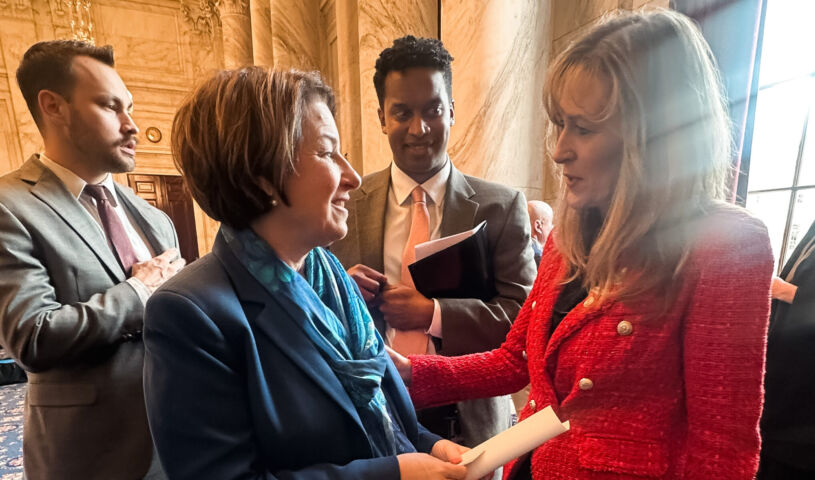Canadian municipalities continue leading the tariff fight
 Ottawa Coun. Tim Tierney and Yarmouth Mayor Pam Mood were among the municipal leaders who recently traveled to Washington D.C. as part of a mission organized by the Federation of Canadian Municipalities to address U.S. President Donald Trump’s ongoing tariff threats. Photo: Tim Tierney
Ottawa Coun. Tim Tierney and Yarmouth Mayor Pam Mood were among the municipal leaders who recently traveled to Washington D.C. as part of a mission organized by the Federation of Canadian Municipalities to address U.S. President Donald Trump’s ongoing tariff threats. Photo: Tim Tierney
Local government leaders from across the country have heeded the call and made themselves part of the Canadian response to U.S. President Donald Trump’s ongoing tariff threats.
The Federation of Canadian Municipalities (FCM) has been at the forefront of numerous conversations with American municipal leaders. One of the most recent took place at a gathering of the National League of Cities. The annual Congressional City Conference took place earlier this month in Washington, D.C., and brought together more than 2,800 American local government leaders.
FCM sent a delegation to speak at the conference, including Tim Tierney and Pam Mood. Tierney is a councillor with the City of Ottawa and the current FCM first vice-president. Mood is the mayor of Yarmouth, N.S., and the current president of the Nova Scotia Federation of Municipalities.
Facts about Tariffs
Much like the on-again, off-again status of Trump’s tariffs, the discussions in Washington were both promising and troubling, according to Tierney and Mood.
Tierney said the goal of the trip was to present the facts about the negative impact of tariffs to an American audience that isn’t always provided with relevant information. As a result, he said “a lot of eyes were opened” during those conversations.
Some of the facts offered by FCM include the reality that Trump’s tariffs would add $21,000 to build new homes in the United States. They would also add some $3,000 to the cost of a new car in the U.S.
“It’s data, and you can’t argue with data. Some presidents may try to, but you can’t argue with data,” Tierney said. “We went down to take the bluster out of everything more than anything and provide them real data per jurisdiction. We armed them with all the information that they required.”
Growing Sense of Fear
The trip to Washington was Mood’s first as part of FCM’s ant-tariff messaging campaign.
Mood describes the trip as having “a mixture of a lot of emotions,” ranging from exciting to eye-opening. The idea, she said, echoing Tierney, was to raise awareness on the true impact of tariffs.
The most important thing to get across to her American colleagues, Mood said, was the understanding that they hurt both economies. The hope after that, from the FCM perspective, is that that mayors and councillors across the U.S. will take that information and put pressure on state and federal officials that could result in the Trump administration changing course.
But the problem is, Mood said, there seems to be a fear among her American colleagues around what happens when someone stands up to the U.S. president.
One of the things Mood said was most disconcerting for the very real feeling that local officials don’t want to speak up out of fear around what the federal government could do to their already burdened local budgets.
“There’s that fear of speaking up. I mean, nobody wants to cross their government,” Mood said. “Over there, it’s a little bit different. It’s very real. And I think we’ve seen that with a number of things – the feeling coming from Washington of, ‘don’t cross us’.”
Sense of Optimism
This year’s keynote speaker at the conference was U.S. Vice President J.D. Vance. The speech, both Tierney and Mood noted, was met with several interruptions from hecklers and booing as Vance urged local leaders to get in line with Trump’s policies.
Tierney said the sentiment from delegates was that the president was pivoting away from saying fentanyl is the issue behind the tariffs. After all, Tierney said, the Canadian government has thrown $1.3 billion at border security. So that original argument no longer seems to carry the same weight.
Instead, Vance started talking about birthrights and Canadians and Mexicans taking away American homes. It is a stance that many in the audience knew didn’t reflect reality and that apparently really upset a lot of people that were in the crowd.
Mood agreed, adding the anger she witnessed in the audience (that is beyond what seemed to be a stacked pro-Republican crowed in the first few rows) gave her hope that the truth about tariffs was finding an audience.
“What really threw me off was [Vance saying] this administration has made rules. And at your level, at the municipal level, you don’t have a choice which ones to follow. Gosh, it felt like a threat,” Mood said. “I was really, really sad for that. But also happy for the fact that people seemed to be getting it. They were just, ‘Yeah, no, we’re not buying what you’re saying’.”
From Crisis to Everyday Life
U.S. Secretary of State Marco Rubio was recently quoted as saying the U.S. direction on tariffs shouldn’t be seen as a blow against Canada, Mexico, or the European Union. Rather, it is U.S. policy and will be applied to everyone.
That statement, Tierney and Mood agreed, leans toward the tariff discussion not being a temporary fight. Instead, the tariff conversation could be ongoing for years to come. And that, they also agreed, is going to add further pressure to local officials.
Everything is downloaded to municipalities, Tierney said. That’s what always happens at the end of the day. The tariff conversation, he said, could well become just another level of what municipal officials do.
However, Tierney said they are also the people best suited, alongside the team at FCM, to continue the fight. FCM has the resources and the people to help, regardless of whether it all seems like “a bit of a three-ring circus.”
Even so, Tierney said he is committed to not only supporting his constituents back home but working for all Canadians as well. But he is also committed to doing so in the most Canadian way possible.
“I’ll continue to be a states person. I’m not going to engage in the bluster and the name calling. I don’t think that helps anybody,” Tierney said. “I’ll never forget my local constituency, which I just finished an hour of calls with them this morning about potholes. But I think there’s a bigger issue that affects us directly. So we’re going to be doing double duty, but it’s nothing new for municipal politicians.”
Seat at the Table
Mood said the tariff conversations have become almost another regular task for municipal officials. But given the pressure on councils across the country to deal with everyday problems, it is understandable, she added, that the pressure will continue to build.
In Yarmouth, Mood said, she has a council and municipal staff that are pulling together to make sure local issues are still addressed. That includes everything from making sure the culverts are clean to buying new fire trucks.
But while the everyday business of the municipality continues, so too does the need for local governments to be involved in the tariff battle. After all, as Mood said, somebody has to be at the table.
“I’m a big fan of I know what I know, and I know what I don’t know. I’m not an expert in some things. But I am darn well an expert at local government, and I know how it [the tariffs] affects the people on the ground,” Mood said. “I’m not just representing the Town of Yarmouth. I’m representing every person that’s on the ground and at the local level. And that’s everybody in Canada.” MW
✯ Municipal World Executive and Essentials Plus Members: You might also be interested in Jeffrey Craft’s article: Cities don’t build themselves.
Sean Meyer is digital content editor for Municipal World.
Related resource materials:
- FCM leads the charge for sustainable communities
- Brampton helping lead charge in Team Canada tariff battle
- FCM, local governments continue Trump tariff fight



